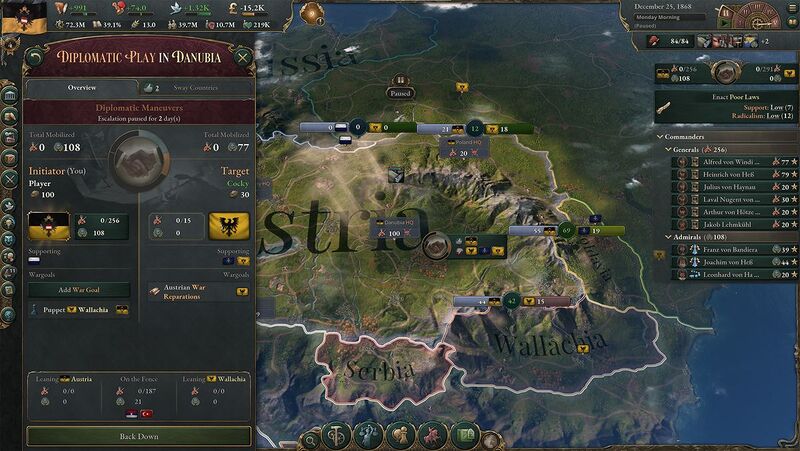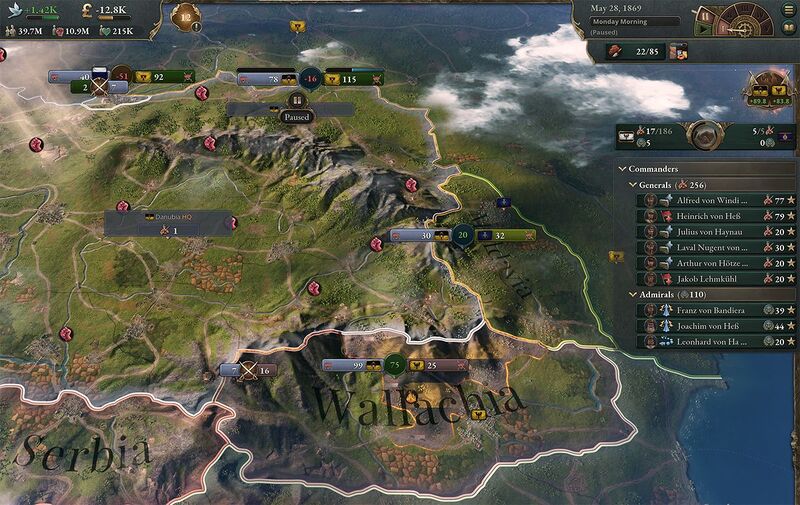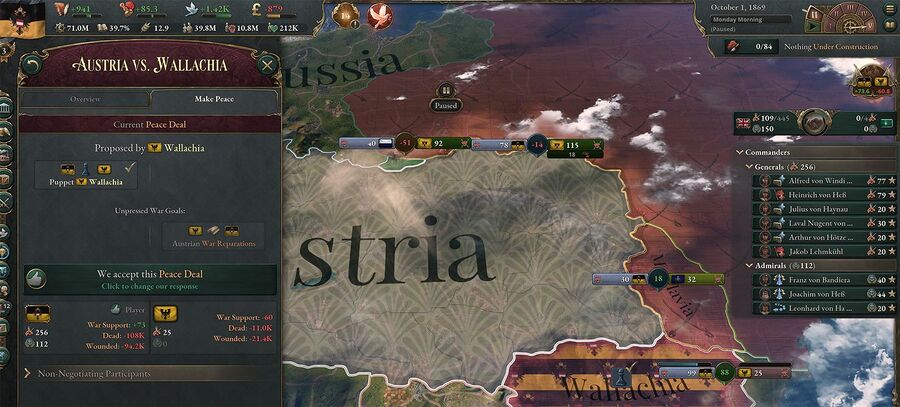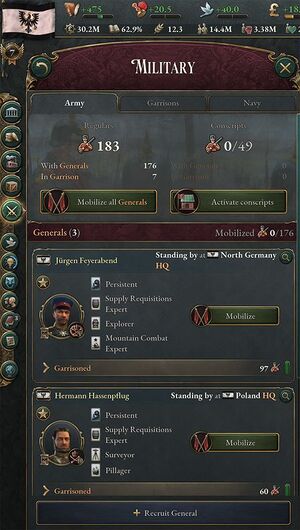When diplomacy fails in Victoria 3, it rests upon a nation's armed forces to achieve its geopolitical goals. In Victoria 3, all wars start after a diplomatic play has not been resolved peacefully and escalates to war. However, it is important to remember that mobilizing and deploying military forces during the diplomatic play is important both in projecting strength during the play (increasing the chance of the other side backing down without a war) and winning the war if it does break out.
当一切外交手段最终失败时,国家要实现其地缘政治目标,就需要诉诸武力。在《维多利亚 3》中,所有未能和平解决的外交博弈最终都会升级为战争。一般来说,你应当在外交博弈过程中及时的调动和部署军事力量,展示自身的军事能力,从而增加对方在不发生战争的情况下退让的机会,同时,一旦战争爆发,这些军队能够及时投入战斗,从而获取优势,并最终赢得战争。
Military structure 军队组织
Armed forces in Victoria 3 are organised in four ways, and in every case it is important to be mindful of the HQ (there are separate HQs for each strategic region) they relate to:
维多利亚 3 中有四种形式的军队,你应当永远注意你的军队所属的总部(每个战略区域都有单独的总部):
- Battalions assigned to generals 从属于陆军将领的陆军营
- Flotillas assigned to admirals 从属于海军将领的舰队
- Unassigned Battalions 未分配的营
- Unassigned Flotillas 未分配的海军舰队
For battalions or flotillas to be given orders, they need to be under a general or admiral. Unassigned battalions are still useful, in that they will contribute to the defence of the strategic region in which they’re located, but unassigned flotillas will not take any part in a war. It will generally not make sense to have unassigned flotillas, as they cost upkeep but cannot be used in war. In the vast majority of cases, unassigned flotillas should be allocated to an admiral – the main exception to this are flotillas used purely for generating diplomatic interests.
要接受命令,一个营队或一个舰队必须从属于一个陆军或海军将领。未指派的营队仍然会参与所属总部所属战略区域的防御,但是未接受命令的海军不会以任何方式参与战斗。一般来说,不应当拥有未指派的舰队,因为这些舰队仍然会消耗维护费用,但无法发挥军事作用。因此,在绝大多数时候应当将你的舰队分配给海军上将,除非那支舰队只是用于维持外交利益
During a diplomatic play 外交博弈中
Once a diplomatic play has started, potential fronts will appear on the map, and generals can be assigned to these fronts. While it can be the case that there are more fronts than generals, bear in mind the opposing forces will have limited numbers of generals as well, and it is not unusual for peripheral fronts to have no forces assigned on either side. It takes time to move between fronts, and it is worth considering the war goals set during the diplomatic play when assigning generals, as controlling these will become important if war does break out (controlling war goals leads to the other side's war support dropping more quickly).
外交博弈开始后,地图上会表示出潜在的战线,可以在这些战线之间分配将领。虽然可能会出现战线比将领多的情况,但请记住,对手的将领数量也是有限的,而且对于不重要的战线来说,双方都没有派兵的情况也很常见。军队在各条战线之间移动需要时间,在分配将领时应当考虑外交博弈中设定的战争目标,因为一旦战争爆发,军事控制控制这些目标非常重要(控制战争目标会导致对方的战争支持度下降得更快)。

Similar to generals, once a diplomatic play has started, admirals can be assigned orders (except for naval invasion, which can’t be assigned until after war has broken out) to different sea nodes. These orders take time to prepare, so there can be value in positioning forces before war breaks out.
与陆军将领类似,一旦外交博弈开始,就可以向不同的海上节点派遣海军将领,并给予其命令(海军入侵除外,其在战争爆发后才能分配)。由于这些命令需要时间准备,在战争爆发前对部队进行预先部署是很有必要的。
Once war breaks out 战争爆发后
Once war breaks out, land warfare occurs along fronts, while naval warfare occurs in sea nodes. On a contested front where both sides have forces, there will be a series of battles, while naval warfare involves battles at each sea node. As would be expected, there are differences in the nature of land and naval warfare:
战争爆发后,前线上会爆发陆战,而海上节点中会爆发海战。在双方都有军队的争夺前线,会发生一系列陆地战斗,而海战则会在每个海上节点爆发。以普遍理性而言,陆战和海战的目的显然是不同的:
- Land warfare is about defending or capturing territory.
- 陆地作战的目的在于防守或夺取地块
- Naval warfare is about attacking/protecting convoys (a disrupted supply network has economic costs, and will also impact on the morale of battalions on overseas fronts), invading, and defending against invasion. Note that while the enemy supply network can be disrupted, and invading armies can be blocked, it is not possible to intercept generals and their forces in transit between fronts.
- 海战的目的在于攻击/护航运输船(破坏对手的补给节点会造成经济影响,同时会影响对手海外营队的士气),海上入侵和防御海上入侵。注意:尽管你可以破坏敌方的补给节点,封锁对方的海上入侵,但你无法阻止对手的营队在前线之间移动。

As the war develops, both sides' war support will decline, based on a range of factors. There are some conditions that prevent war support from falling below zero, and it is worth being mindful of these, as if one side’s war support falls to -100, they will automatically capitulate and all of the war goals against them will be pressed. It is also possible to negotiate peace with some or none of the war goals pressed before this happens.
随着战争进程的推进,双方的战争支持度都会下降,下降速度右诸多因素影响。在几种特定条件下,战争支持度可以低于0,在战争中应当永远注意这点。一旦国家的战争支持度下降到-100,它就会自动投降,所有针对其的外交博弈将会被强制执行。不过比起自动投降,更为常见的是,在敌方支持度下降至某个阈值后,你可以试图与之和谈,他们将会同意让出若干个外交博弈目标,以换取和平。

